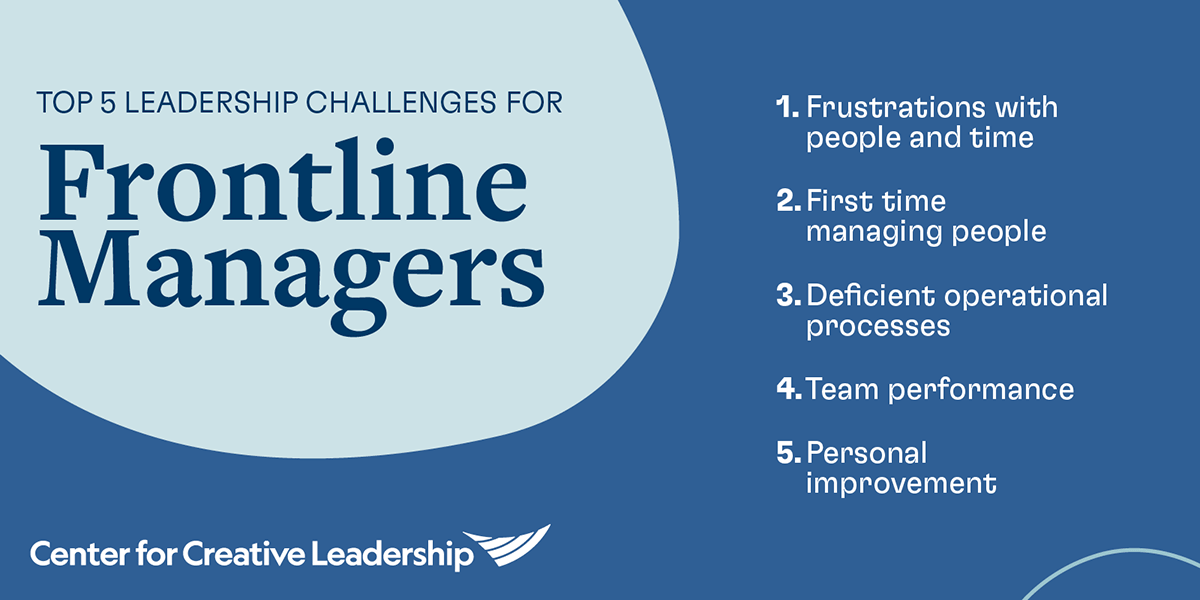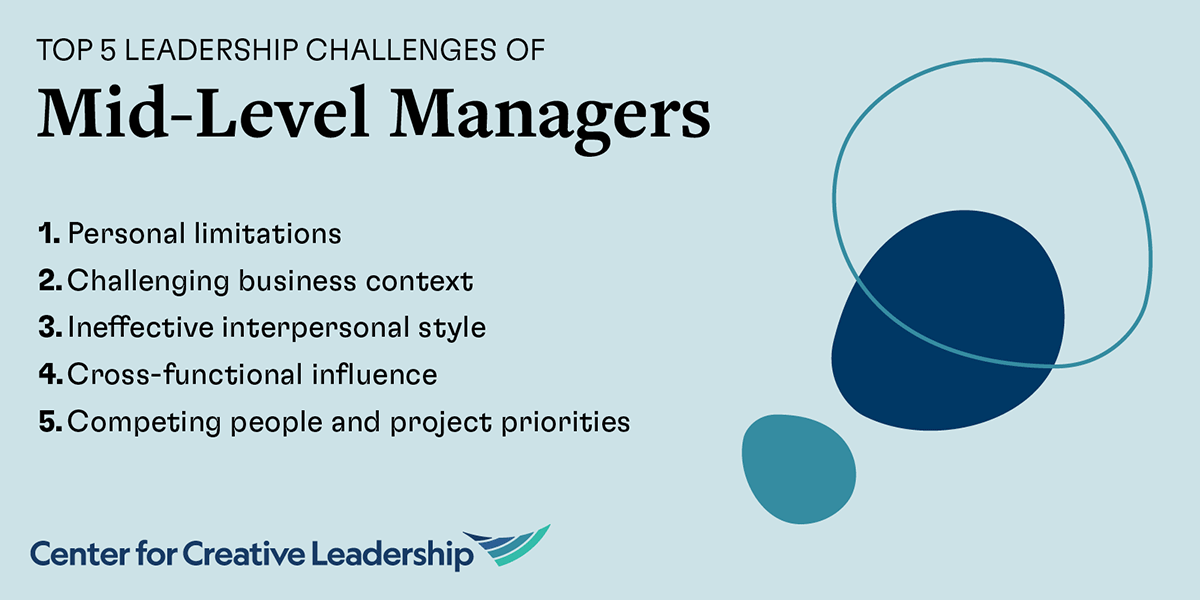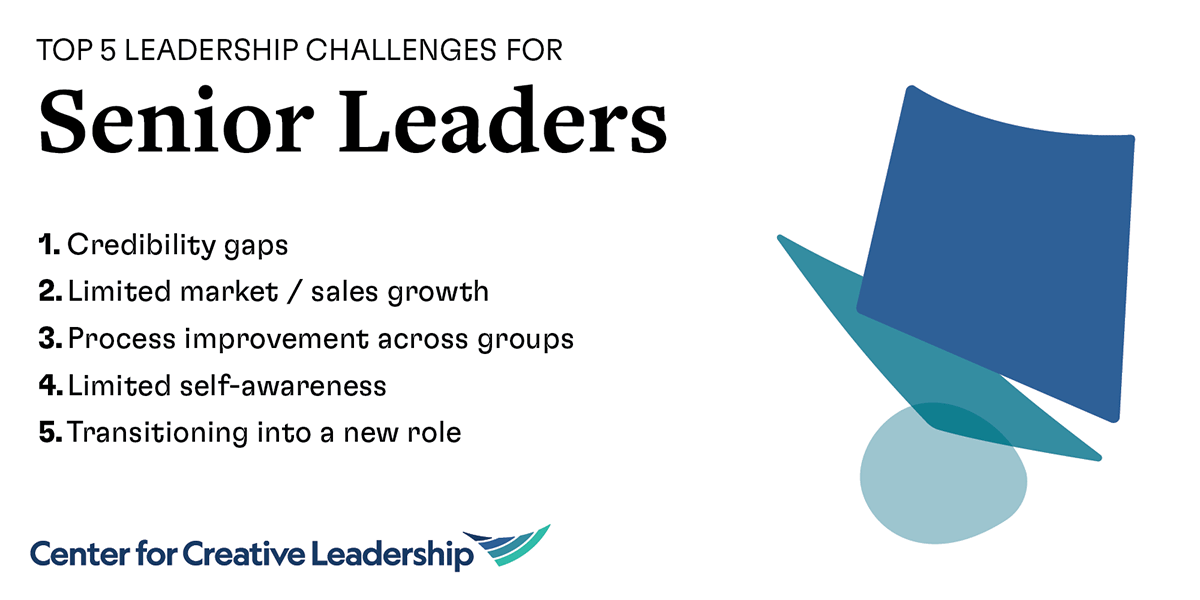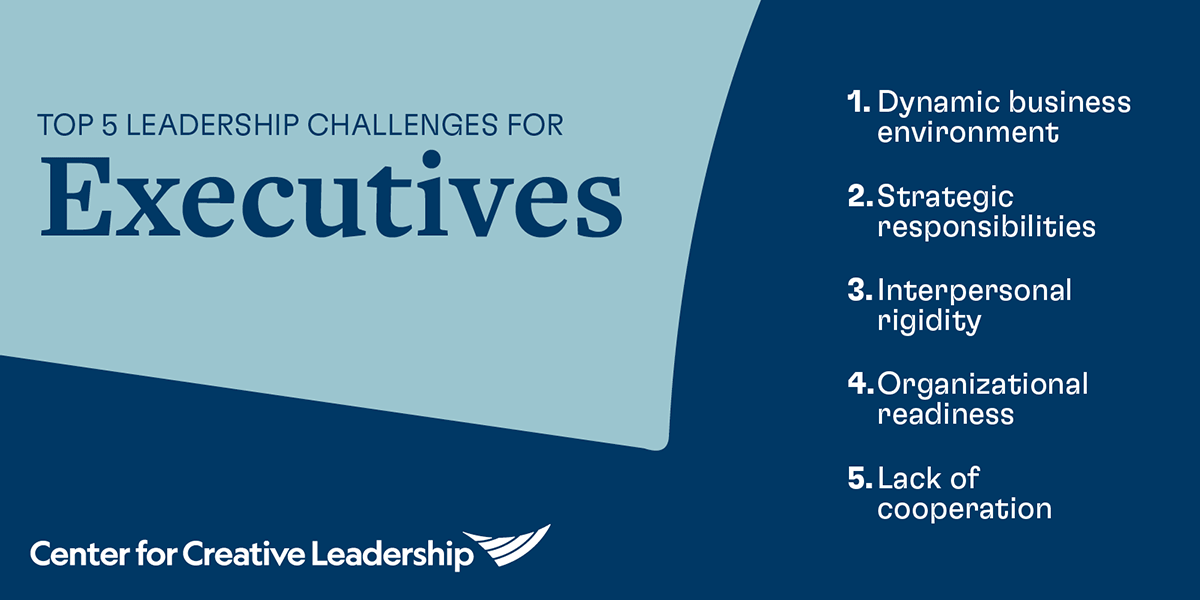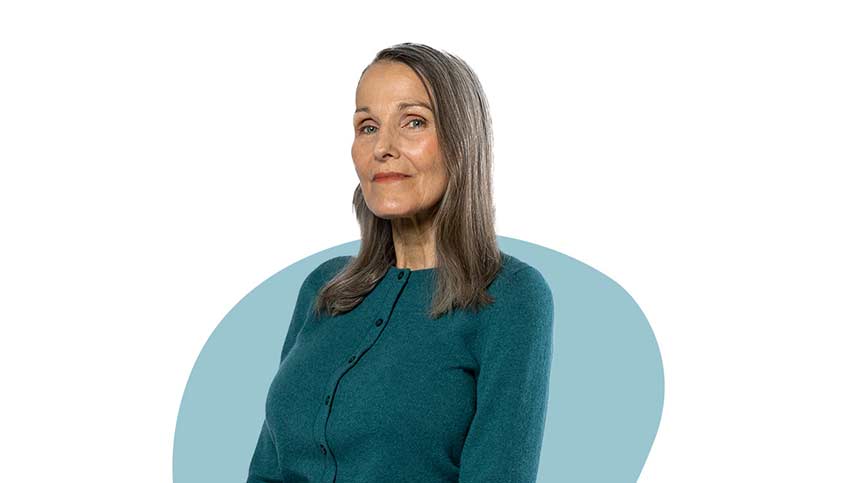The Most Common Challenges of Leadership at Every Level
Here we present what our research has found are today’s biggest challenges of leadership — the top 5 challenges faced by leaders at each of level of the organization — ranked by their relevance post-pandemic. And because development is more effective when it uses data to support the challenges of leaders at different levels, this list of leadership issues can be the focus for training & development efforts in all organizations, everywhere in the world.
- For Frontline Managers
- 1. Frustrations with people and time
- 2. First time managing people
- 3. Deficient operational processes
- 4. Team performance
- 5. Personal improvement
- For Mid-Level Managers
- 6. Personal limitations
- 7. Challenging business context
- 8. Ineffective interpersonal style
- 9. Cross-functional influence
- 10. Competing people and project priorities
- For Senior Leaders
- 11. Credibility gaps
- 12. Limited market / sales growth
- 13. Process improvement across groups
- 14. Limited self-awareness
- 15. Transitioning into a new role
- For Executives
- 16. Dynamic business environment
- 17. Strategic responsibilities
- 18. Interpersonal rigidity
- 19. Organizational readiness
- 20. Lack of cooperation
The Top Leadership Challenges of Frontline Managers
Regardless of where they live or work, those managing others in supervisory roles reported that their most common leadership challenge is frustrations with people and time — and this issue has only increased in frequency since the pandemic. Here are the top 5 most common challenges for frontline leaders, based on our research:
Frustrations With People and Time
Many frontline managers reported that their top leadership issue is feeling overwhelmed with inefficiencies and frustrated with others. This includes challenges with offering guidance to direct reports, overcoming resistance to change, dealing with difficult employees, and adjusting communication and feedback styles to collaborate more effectively with different people. And again, this appears to have become an even bigger concern for leaders at this level since the pandemic.
First Time Managing People
Another common leadership challenge among new managers is learning to juggle day-to-day challenges — such as managing others who were formerly peers, or employees who are older than they are — and just generally gaining respect as a new, first-time people leader.
Deficient Operational Processes
Needing stronger operational processes to address organizational problems was another frequently cited leadership challenge for this group.
Team Performance
First-level leaders also reported challenges with developing teams, giving effective feedback, providing direction, holding coaching conversations, and dealing with resistance from direct reports.
Personal Improvement
Learning to be better at active listening to understand the perspectives of others, improving flexibility, and being less reactive in pursuit of an “ideal self” are other commonly reported challenges for leaders on the front lines, our research found.
The Top 5 Leadership Challenges of Mid-Level Managers
Managers who are leading from the middle — with senior leaders above them and direct reports below — face many similar challenges of leadership as well. Our research found that the most common issues for mid-level managers were:
Personal Limitations
A top challenge for leaders at this level is their own personal limitations and feelings of inadequacy, as they often must overcome their own doubts about their abilities and readiness to lead — as well as the doubts of their peers or supervisors. Dealing with the challenge of personal limitations requires overcoming impostor syndrome, humility to seek the input of others, courage to do the right thing, and projecting confidence while communicating effectively.
Since the pandemic, mid-level managers have reported this as an issue even more frequently. With new cultures brought on by remote and hybrid workplaces, overcoming common limitations in order to make an impact as a leader has become even more challenging.
Business Challenges
In a tumultuous work environment, managers (particularly mid-level leaders) may struggle to deliver results. Leading within a challenging business context requires the careful deployment of limited resources, improved processes, and keeping employees engaged and motivated.
Ineffectiveness
When a mid-level leader has an ineffective interpersonal style, they struggle with relationships. This can play out on a spectrum, from dominating interactions to lacking the self-confidence to be assertive. On the other hand, effective interpersonal styles and embodying the characteristics of a good leader allow for open and honest conversations.
Influence
Successful leadership requires the ability to influence others beyond one’s group — often without formal authority. For those leading from the middle, the challenge of influencing others across functions includes building credibility, developing cross-organizational networks, and building and bridging partnerships.
Competing Priorities
Mid-level leaders report that they often find it difficult to balance competing people and project priorities, especially when they’re sandwiched between project-based deadlines and their employees’ engagement. It’s an important paradox that leaders must manage both relationships and tasks effectively. When resources are limited, motivating team members who vary in personality, abilities, and experience can feel at odds with effective project management.
The Top 5 Leadership Challenges for Senior Leaders
We noticed that the pandemic shifted the top leadership challenges for this group somewhat. Before COVID, limited self-awareness was cited as the most frequent leadership issue among senior leaders who head up functions, business units, departments, divisions, and regions, but the frequency of this challenge dropped significantly more recently. The challenge of overcoming credibility gaps, on the other hand, has become more pressing after the pandemic.
Credibility Gaps
This includes the challenge of building credibility as an organizational leader. Examples include gaining the trust of stakeholders and enhancing visibility within an organization. Senior leaders may also need to strengthen their leadership image or presence to be most effective.
Limited Market / Sales Growth
Making strategic shifts to maximize market growth and sales is another top challenge of senior leaders. This may include expanding the organization beyond core products, extending market reach, shifting to a market / customer orientation, and better aligning of sales.
Process Improvement Across Groups
Another key challenge for senior leaders is influencing the organization to improve and accept new processes, which requires being a strategic leader, effective boundary spanning leadership, and developing a broader perspective by taking a systemic view.
Limited Self-Awareness
Understanding how others perceive them and recognizing their impact on others — along with improving their confidence, approachability, and communication style (particularly when delivering difficult messages) — can be especially challenging for leaders at the senior level.
Transitioning Into a New Role
Adapting to changes in responsibilities and managing new people or former peers is a final key leadership issue at this level. This challenge may be brought on by a promotion, a new role, a functional shift, or a geographic move, or simply through preparing for the C-suite.
The Top 5 Leadership Challenges for Executives
Finally, senior executives leading the enterprise told us that their top 5 leadership challenges are as follows.
Dynamic Business Environment
For C-level leaders, the challenge of working in a dynamic business environment topped their list of leadership issues. This challenge can be brought about by new regulations, market and economic conditions, competition, or growth. To be effective, leaders must be able to develop and keep the talent needed to support change and revise their organization’s models and systems as required.
Notably, this challenge experienced the biggest rise in the wake of the pandemic. Even before the pandemic, senior executives were already used to leading their organizations in adapting to ever-changing circumstances, but COVID and its fallout accelerated that need even more.
Strategic Responsibilities
Developing strategy for an organization is another top leadership challenge for senior executives. This includes aligning priorities and initiatives across groups and developing teams to support strategic efforts. It’s helpful when senior leaders are able to link business strategy to leadership strategy.
Interpersonal Rigidity
For many senior leaders, shifting the way they interact with others to be more effective and the ability to adapt their style for varying situations or stakeholders is an important challenge. Leaders in C-suite need to have different techniques for flexing their approach, including in how they communicate the vision, manage or influence others, or leverage power over others to get things done.
Organizational Readiness Amid Uncertainty
Preparing their organizations for a turbulent future is an ongoing issue for senior executives. This challenge of leadership is experienced most often when there are organizational mission shifts, significant resource constraints, technology changes, or when new ways of working are needed.
Lack of Cooperation
Lastly, influencing others toward collaboration is a key leadership challenge for senior executives. This is especially common when they’re new to a role, managing former peers or more experienced colleagues, or collaborating with others on the senior team.
Access Our Webinar!
Watch our webinar, The Biggest Challenges Facing Today’s Leaders at Every Level, and learn more about what our researchers found are the top leadership challenges around the world and how organizations can directly address them.
How to Respond to These Top Leadership Challenges
Tips to Help Leaders Address the Most Common Leadership Issues
Now that you know the most common challenges of leadership, how do you begin addressing them? One way is by looking at the larger themes that emerged from our leadership challenge research. Across all levels of the organization, we found that the challenges of leadership generally fall into 3 high-level themes, related to:
- Challenges of personal growth,
- Challenges related to managing people and getting work done, and
- Challenges in managing across the organization and within a larger system.
Here are some recommended ways to respond to these 3 common themes in our overall leadership challenges research. Many of these suggestions are part of developing the core leadership skills needed in every role, at every stage of a career.
1. To respond to leadership challenges related to your personal growth, work to maximize personal value.
Personal shortcomings and the aspiration to become a better leader define our first theme. Challenges here include learning to be more assertive during interactions, developing confidence, and understanding how others perceive you.
Individuals overcome leadership issues and create value for their organizations by focusing on the unique contributions that only they can make. Understanding what those unique values are, and delegating everything else (or as close to everything else as possible), allows leaders to maximize their value.
It’s important to recognize your own characteristics, behaviors, and habits in order to know what may be triggering challenges for you in your career. This way, you can work toward increasing your self-awareness and strengthening specific skills and growing as an individual leader.
Some internal challenges that many leaders face include a lack of confidence, a fear of failure, maintaining authenticity during self-promotion, impatience, resistance in responding to new ideas, or struggling to manage conflict in the workplace. All of these can be potential roadblocks to leadership success.
Understanding your own strengths and weaknesses and maximizing your unique value are part of improving your personal leadership brand.
2. To respond to leadership challenges around managing people and getting work done, focus on delegating more to others.
Our second leadership challenge theme involves the demands of managing both people and tasks. Specific challenges include managing for the first time, building cooperation between people, and overseeing multiple projects that compete for importance and resources.
You’ll be more productive, give your colleagues a greater sense of ownership, and build more trust on your team if you delegate, as well. But effective delegation requires more than just getting a task off your desk — it involves a repeating cycle of 4 key steps:
- Understanding your preferences. Effective delegators prioritize their workload and decide which tasks to keep and which to give to someone else. They also understand how much feedback they want while the person they’ve delegated to works on the task.
- Knowing your people. To delegate effectively, you must assign tasks to others with the necessary knowledge and skills. That means that you have to understand people’s preferences and abilities, using delegation to help direct reports develop, and coach people while allowing them to learn as they take on new tasks.
- Being clear about the purpose of the task. A task’s purpose gives it meaning. By aligning this purpose with team or individual beliefs and goals, delegation can become part of purpose-driven leadership and an opportunity for personal growth.
- Assessing and rewarding. You should engage in collaboration and work with your direct reports to develop ways to help them, and you, decide if a task has been completed properly, and to reward them appropriately.
3. To respond to leadership challenges related to managing across the organization, work to increase boundary spanning and build high-performing teams.
Working within the larger system of an organization is our third high-level leadership challenge. Examples include working in a dynamic business environment, needing stronger operational processes, and creating cross-functional influence.
As a leader, you must be able to create and lead teams effectively. To build high-performing teams, use our team effectiveness framework, which has 4 components:
- Core: Communicate a team’s reason for being so that all team members understand their core purpose and value. (A team charter can help with this.)
- Collective Mindset: Be sure everybody on the team knows what it takes to be a good team member. Teams adopt a collective mindset when they understand all members’ roles and responsibilities, as well as team norms for how team members work together.
- Cohesive Relationships: Ensure team members relate interpersonally by fostering a psychologically safe work environment where everybody feels a sense of belonging, is treated with respect, and communicates effectively.
- Connection: Teams can have a broader organizational impact when collaborating across boundaries. In other words, when colleagues who have different backgrounds and experiences connect, innovation and collaboration are enhanced.
A Final Word for HR Leaders on Our Leadership Challenges Research
Focus Development Efforts to Address the Top Challenges of Leaders
Developmental initiatives are more effective when they align with the real challenges that leaders are facing. For those who work in HR or Learning & Development, understanding these common leadership issues can be the catalyst for creating initiatives that truly address real-world needs, growing needed leadership capabilities for your organization’s talent pipeline.
Ready to Take the Next Step?
Build your team’s capacity for overcoming common leadership challenges. Our array of leadership development programs are carefully designed to address the leadership challenges faced by leaders at every level.


